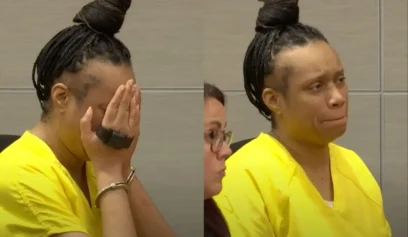Thousands of Black women and men are reported missing each year, yet their names often don’t get the mainstream attention as white missing people receive. That state of affairs is frustrating for advocates and relatives of the missing African-Americans such as James Rushing, whose sister, Deidre Reid, 41, has been missing since Sept. 3.
“What hurts the most is when they look up at you and they ask the question, have they found my mama,” said Rushing of his nieces and nephew who are struggling to wrap their heads around how and why their mother disappeared.
Deidre Reid of Pageland, South Carolina, is a mother of three children, an 8-year-old son and 14-year-old twin daughters. She was last seen at a Greyhound bus station in Charlotte, North Carolina, when she drove her ex-boyfriend and son’s father, Emmanuel Bedford, to the bus station so he can return to Augusta, Georgia.
Rushing says witnesses at the bus station saw Reid and Bedford arguing then “they saw him pull her into the backseat and drove off in the vehicle.” he said. Reid and Bedford drove to the bus station in her gray 2004 Chevrolet Tahoe, but Rushing says there have been no signs of the vehicle since.
In the weeks that followed, Rushing says the family has searched nonstop for Reid by handing out flyers and combing communities spreading the word of her disappearance.
On Friday, September 24, the Pageland Police Department posted on its Facebook page reassuring the community they are focused on Reid’s disappearance. Pageland police also listed Bedford as a person of interest in the case.
Last year, the FBI reported more than 543,018 missing person records and 182,529 of them were Black men and women. By the end of 2020, 480,832 missing people were either found or had their case canceled by the entering agency.
Nathalie Wilson is the co-founder of Black and Missing Foundation, and she believes the number of missing Black people is higher than official records suggest. “I think the key here is, reported missing. We are sure, there are so many more that are not reported missing,” said Wilson.
Wilson says other reasons for underreported missing people include fears of deportation or distrust for the police. Wilson says families have shared with her their experiences with police misclassifying a missing person which greatly impacts the intensity of the search effort.
“Can you imagine as a parent, you know your child’s behavior better than anybody else, so to be shunned like that, that your child is a runaway, it has to be very frustrating and disturbing? We’re also noticing a trend with adults where they’re classified as being involved with some kind of criminal activity,” said Wilson.
Wilson adds that the time it takes to find a missing person varies depending on the circumstances surrounding their disappearance. She says it is frustrating to see many missing Black people overlooked in favor of missing white women or as the late journalist Gwen Ifill called it, “Missing White Woman Syndrome.”
“It’s basically a term the media is fascinated with young, blond, attractive white women when they are missing, and they tend to dominate the news cycle and it is frustrating because our missing do not get equal coverage,” said Wilson.
Wilson encourages the Black community to take the lead in raising awareness for people missing in their communities by pressuring the media and police to do more when cases arise.
Deidre Reid’s family intends to keep the pressure on their South Carolina community and police until they learn what ultimately happened to her.
“It only takes a second for somebody to be missing, but it takes a community to bring a person back,” said Rushing.


